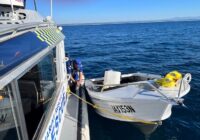Article by METSTRADE
Technological advancements are reshaping industries at an unprecedented pace, and staying competitive in the marine sector requires continuous adaptation and learning. As highlighted in a recent conversation with James Ward, CEO of Marine Resources, young professionals must embrace new technologies and develop crucial skills to thrive in a hybrid, remote, and technology-driven working environment.
To future-proof your career, professionals should focus on a combination of technical, analytical, and interpersonal skills. These will not only help you navigate technological shifts but also enhance your value in the evolving marine industry. Here are key areas:
1. Embracing Technological Literacy
Technological proficiency is a non-negotiable skill in the modern workforce, particularly in industries like marine, where automation and digital solutions are becoming vital to operations. Young professionals should actively seek out knowledge on the latest technological trends, particularly Artificial Intelligence (AI), which is now a critical tool for businesses.
Understanding not just how AI works but how to apply various AI tools beyond just ChatGPT, can provide significant advantages. “There are thousands of different AI tools that are useful to businesses, and young professionals who demonstrate knowledge and experience with them will stand out,” says James Ward.
Alongside AI, you should be aiming to gain hands-on experience with automation tools. With skill shortages in areas like boat building and operations, knowing how to automate processes can be a game-changer for businesses. Whether it’s streamlining administrative tasks or optimising production workflows, basic automation skills will be increasingly valuable.
2. Cultivating a Growth Mindset
Adaptability becomes a key asset as industries undergo rapid technological advancements. It’s not just about earning certificates or completing formal training; it’s about being open to continuous learning and staying flexible in a shifting environment.
James Ward emphasises that “Industries, especially within the marine sector, are seeking professionals who not only understand current technologies but are eager to keep pace with the innovations that shape the future. Being adaptable to new tools, platforms, and processes ensures you’re well-equipped to handle the technological evolution within your field.”.
As automation and AI become more prevalent, human creativity and problem-solving have gained more value. While machines can automate repetitive tasks, it’s your critical thinking and creative approach to solving complex problems that will set you apart. The ability to learn and integrate new technologies while balancing human-centric skills makes you an indispensable asset in the workforce.
3. Digital and Data Literacy
With businesses becoming more data-driven, understanding and interpreting data is another essential skill for young professionals. While you don’t need to be a full-fledged data analyst, having a basic understanding of analytics and knowing how to make informed decisions based on data will enhance your effectiveness in any role.
Being “digitally minded” means understanding the value of data in decision-making and being able to use digital tools to interpret it. Whether analysing sales figures or tracking performance metrics, data-driven insights can help optimise operations and drive business growth. This skill is especially relevant in industries where margins can be tight and data-driven decisions offer a competitive edge.
4. Building Strong Communication and Collaboration Skills
As remote and hybrid working becomes more common, communication and collaboration skills are more critical than ever. You need to be adept at virtual communication, whether it’s managing projects over video calls or collaborating with a distributed team.
Ward also emphasises the importance of emotional intelligence (EQ). While many may fully develop emotional intelligence in their late 20s or early 30s, being aware of and working on EQ skills early in your career is key. This includes managing your own emotions, navigating interpersonal relationships, and understanding the emotional dynamics of your team. “In an increasingly automated world, the ability to manage relationships and communicate effectively is crucial,” Ward notes.
5. Investing in Personal Branding and Networking
Your professional network and personal brand have never been more important, especially when first impressions are often formed online. Ward advises young professionals to be “obsessed with their network,” but not just in terms of numbers. Instead, focus on building meaningful connections and engaging with your network to create lasting professional relationships.
A strong LinkedIn presence and a well-curated personal brand can make a significant impact in job searches. Employers are increasingly looking at candidates’ digital footprints even before reviewing CVs. You can improve your visibility and credibility in your industry by showcasing your expertise and growing your network.
6. Resilience and Adaptability
As industries evolve, professionals need to demonstrate resilience in the face of change. Resilience is a trait that employers value, whether it’s responding to slow market conditions, adapting to new technologies, or dealing with industry disruptions. Ward suggests that “Young professionals should show they can pivot when needed, whether it’s adapting their role or supporting a company through technological or market shifts.”.
7. Focus on Sustainability and Ethical Responsibility
Businesses across all industries are becoming more focused on sustainability and ethical practices. You should be able to demonstrate your understanding of these issues and how they relate to both technology and business practices. As Ward points out, showing that you can bring insight into areas like sustainability or social responsibility will give you a significant edge in the competitive job market.
Visit the YPC in the Career Zone at METSTRADE 2024, proudly partnered with Marine Resources. If you’re seeking personalised career advice, hands-on workshops, or networking opportunities, this is your chance to learn, grow, and explore future opportunities in the marine industry. View the 2024 programme and register now to secure your spot!







